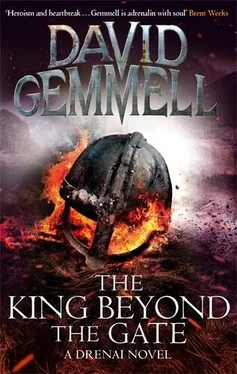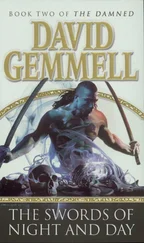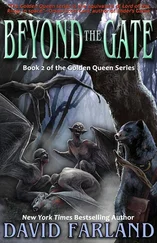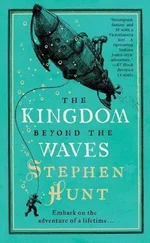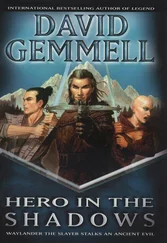Ananais sat in a corner with his back against the cool grey stone wall of the old stable. The machine had so far taken more than ten minutes to load. He lifted his mask and scratched his chin. Ten minutes for fifty arrows! One archer could let fly twice that number in half the time. But Lake was trying hard and Ananais could see no reason to demoralise him.
'Ready?' Lake asked his assistants at the far end of the room. Both men nodded and hurried away behind large sacks of oats and grain.
Lake glanced at Ananais for approval and then tugged the release cord. The massive arm flashed forward and fifty arrows hammered into the oak door, some passing through and striking sparks from the wall beyond. Ananais strode forward, impressed by the killing power. The door was a mess, having given way at the centre where more than a third of the shafts had struck home.
'What do you think?' asked Lake anxiously.
'It needs to spread more,' said Ananais. 'If this had been loosed at a charging mass of Joinings, fully half the shafts would have hit only two beasts. But it needs to spread laterally — can you do that?'
'I think so. But do you like it?'
'Do you have any slingshot?'
'Yes.'
'Load that in the bowl.'
'It will ruin the cap,' protested Lake. 'It's designed to shoot arrows.'
Ananais put his hand on the young man's shoulder. 'It's designed to kill, Lake. Try the shot.'
An assistant brought a sack of shot and poured several hundred pebble-sized rounds of lead into the copper bowl. Ananais took over the cranking of the device and they hooked the leather into place within four minutes.
Then Ananais moved to one side, taking the release thong in his hand. 'Stand clear,' he ordered. 'And forget about the sacks. Get outside the door.' The assistants scurried to safety and Ananais tugged the release. The giant bow-arm leapt forward and the slingshot thundered into the oak door. The sound was deafening and the wood split with a groan, falling to the floor in several pieces. Ananais gazed down at the leather cap on the bow — it was twisted and torn.
'Better than arrows, young Lake,' he said as the young man ran to his machine, checking the cap and the leather drawstring.
'I will make a cap in brass,' he said, 'and increase the spread. We shall need two cranks, one on either side. And I'll have the slingshot filed to give points on four sides.'
'How soon can you have one ready?' asked Ananais.
'One? I already have three ready. The adjustments will take only a day and then we shall have four.'
'Good work, lad!'
'It's getting them up to the valleys that concerns me.'
'Don't worry about that — we don't want them in the first line of defence. Take them back into the mountains; Galand will tell you where to place them.'
'But they could help us to hold the line,' argued Lake, his voice rising. Ananais took him by the arm, leading him out from the stable, and into the clear night air.
'Understand this, lad: nothing will help us hold the first line. We don't have the men. There are too many passes and trails. If we wait too long we shall be cut off, surrounded. The weapons are good and we will use them — but further back.'
Lake's anger subsided, to be replaced by a dull, tired sense of resignation. He had been pushing himself hard for days without rest: seeking something, anything, that could turn the tide. But he was not a fool and secretly he had known.
'We cannot protect the city,' he said.
'Cities can be rebuilt,' answered Ananais.
'But many people will refuse to move. The majority, I wouldn't wonder.'
'Then they will die, Lake.'
The young man removed his leather work apron and sat back on a barrel top. He screwed the apron into a tight ball and dropped it at his feet. Ananais felt for him then, for Lake was staring down at his own crumpled dreams.
'Damn it, Lake, I wish there was something I could say to lift you. I know how you feel… I feel it myself. It offends a man's sense of natural justice when the enemy has all the advantages. I remember an old teacher of mine once saying that behind every dark cloud the sun was just waiting to boil you to death.'
Lake grinned. 'I had a teacher like that once. A strange old boy who lived in a hovel near the west hill. He said there were three kinds of people in life: winners, losers and fighters. Winners made him sick with their arrogance, losers made him sick with their whining and fighters made him sick with their stupidity.'
'In which category did he put himself?'
'He said he had tried all three and nothing suited him.'
'Well, at least he tried. That's all a man can do, Lake. And we shall try. We will hit them and hurt them. We will bog them down in a running war. Knuckle and skull, steel and fire. And with luck, when Tenaka gets back, he will mop them up with his Nadir riders.'
'We don't seem to be exactly overflowing with luck,' Lake pointed out.
'You make your own. I put no faith in gods, Lake. Never have. If they exist, they care very little — if at all — about ordinary mortals. I put my faith in me — and you know why? Because I have never lost! I've been speared, stabbed and poisoned. I've been dragged by a wild horse, gored by a bull and bitten by a bear. But I have never lost. I've even had my face ripped away by a Joining, but I'm still here. And winning is a habit.'
'You are a hard act to follow, Darkmask. I won a foot-race once, and was third in the Open Wrestling at the Games. Oh. . and a bee stung me once when I was a child and I cried for days.'
'You'll do, Lake! Once I have taught you how to be a good liar! Now, let's get back in there and work on the weapons you have devised.'
* * *
From dawn to dusk for three days, Rayvan and scores of helpers toured the city preparing the people for evacuation into the depths of the mountains. The task was thankless. Many were those who refused to consider moving and some even scoffed at the threat Rayvan outlined. Why should Ceska attack the city, they asked? That's why it was built without walls — there was no need to sack it. Arguments developed and doors were slammed. Rayvan endured insults and humiliation, yet still she tramped the streets.
On the morning of the fourth day the refugees gathered in the meadows to the east of the city; their possessions were piled on carts — some drawn by mules, others by ponies or even oxen. The less fortunate carried their belongings on their backs in canvas bundles. In all there were fewer than two thousand people — twice that number had elected to stay.
Galand and Lake led them out on the long hard trek to the highlands, where already three hundred men were building crude shelters in hidden valleys.
Lake's weapons of war, covered in oiled leather, had been placed on six wagons which headed the column.
Rayvan, Decado and Ananais watched the refugees set out. Then Rayvan shook her head, cursed and marched back to the council chamber without another word. The two men followed her. Once inside, her anger burst into the open.
'What in the name of Chaos is going on in their heads?' she raged. 'Have they not seen enough of Ceska's terror? Some of those people have been friends of mine for years. They are solid, intelligent, reasoning people. Do they want to die?'
'It is not that easy, Rayvan,' said Decado softly. 'They are not used to the ways of evil and they cannot conceive why Ceska would want to butcher the city's population. It makes no sense to them. And you ask as if they have not seen enough of Ceska's terror. In short, they have not! They have seen men with their arms lopped off, but the spectators can ask: Did he deserve it? They have heard of starvation and plague in other areas, but Ceska has always had an answer for that. He slides the blame from himself with rare skill. And truly they do not want to know. For most men life is their home and their families, watching the children grow, hoping next year will be better than this.
Читать дальше
